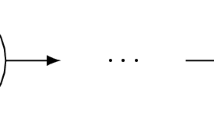Abstract
This note describes an importance sampling (IS) algorithm to estimate buffer overflows of stable Jackson networks with a tree topology. Three new measures of service capacity and traffic in Jackson networks are introduced and the algorithm is defined in their terms. These measures are effective service rate, effective utilization and effective service-to-arrival ratio of a node. They depend on the nonempty/empty states of the queues of the network. For a node with a nonempty queue, the effective service rate equals the node’s nominal service rate. For a node i with an empty queue, it is either a weighted sum of the effective service rates of the nodes receiving traffic directly from node i, or the nominal service rate, whichever smaller. The effective utilization is the ratio of arrival rate to the effective service rate and the effective service-to-arrival ratio is its reciprocal. The rare overflow event of interest is the following: given that initially the network is empty, the system experiences a buffer overflow before returning to the empty state. Two types of buffer structures are considered: (1) a single system-wide buffer shared by all nodes, and (2) each node has its own fixed size buffer. The constructed IS algorithm is asymptotically optimal, i.e., the variance of the associated estimator decays exponentially in the buffer size at the maximum possible rate. This is proved using methods from (Dupuis et al. in Ann. Appl. Probab. 17(4):1306–1346, 2007), which are based on a limit Hamilton–Jacobi–Bellman equation and its boundary conditions and their smooth subsolutions. Numerical examples involving networks with as many as eight nodes are provided.
Similar content being viewed by others
References
Chang, C.-S., Heidelberger, P., Juneja, S., Shahabuddin, P.: Effective bandwidth and fast simulation of ATM intree networks. Perform. Eval. 20, 45–66 (1994)
De Boer, P.-T., Nicola, V.F.: Adaptive state-dependent importance sampling simulation of Markovian queueing networks. Eur. Trans. Telecommun. 13, 303–315 (2001)
De Boer, P.-T., Kroese, D.P., Rubenstein, R.Y.: A fast cross-entropy method for estimating buffer overflows in queueing networks. Manag. Sci. 50, 883–895 (2004)
Dupuis, P., Wang, H.: Importance sampling, large deviations and differential games. Stoch. Stoch. Rep. 76(6), 481–508 (2004)
Dupuis, P., Wang, H.: Subsolutions of an Isaacs equation and efficient schemes for importance sampling: Examples and numerics (2005). Preprint available at http://www.dam.brown.edu/lcds/publications
Dupuis, P., Wang, H.: Adaptive importance sampling for uniformly recurrent Markov chains. Ann. Appl. Probab. 15(1), 1–38 (2005)
Dupuis, P., Wang, H.: Subsolutions of an Isaacs equation and efficient schemes for importance sampling: Convergence analysis. (2005). Preprint available at http://www.dam.brown.edu/people/huiwang
Dupuis, P., Wang, H.: Importance sampling for Jackson networks. Queueing Syst. 62, 113–157 (2009)
Dupuis, P., Sezer, A.D., Wang, H.: Dynamic importance sampling for queueing networks. Ann. Appl. Probab. 17(4), 1306–1346 (2007)
Glasserman, P., Kou, S.-G.: Analysis of an importance sampling estimator for tandem queues. ACM Trans. Model. Comput. Simul. 5, 22–42 (1995)
Juneja, S., Nicola, V.: Efficient simulation of buffer overflow probabilities in Jackson networks with feedback. ACM Trans. Model. Comput. Simul. 15, 281–315 (2005)
Kroese, D.P., Nicola, V.: Efficient simulation of Jackson networks. ACM Trans. Model. Comput. Simul. 12, 119–141 (2002)
Parekh, S., Walrand, J.: A quick simulation method for excessive backlogs in networks of queues. IEEE Trans. Autom. Control 34, 54–66 (1989)
Sadowsky, J.S.: Large deviations theory and efficient simulation of excessive backlogs in a GI/GI/m queue. IEEE Trans. Autom. Control 36, 1383–1394 (1991)
Sezer, A.D.: Dynamic importance sampling for queueing networks, Ph.D. thesis, Brown University Division of Applied Mathematics (2005). Preprint available at http://www.dam.brown.edu/people/sezer
Sezer, A.D.: Asymptotically optimal importance sampling for Jackson networks with a tree topology (2007). Preprint, available at arXiv:0708.3260
Siegmund, D.: Importance sampling in the Monte Carlo study of sequential tests. Ann. Stat. 4, 673–684 (1976)
Wei, L., Qi, H.: An efficient importance sampling method for rare event simulation in large scale tandem networks. In: Proceedings of the 2002 Winter Simulation Conference, pp. 580–587 (2002)
Author information
Authors and Affiliations
Corresponding author
Rights and permissions
About this article
Cite this article
Sezer, A.D. Asymptotically optimal importance sampling for Jackson networks with a tree topology. Queueing Syst 64, 103–117 (2010). https://doi.org/10.1007/s11134-009-9139-4
Received:
Revised:
Published:
Issue Date:
DOI: https://doi.org/10.1007/s11134-009-9139-4
Keywords
- Dynamic importance sampling
- Rare event simulation
- Queuing networks
- Jackson networks
- Overflow probability
- Large deviations
- Hamilton–Jacobi–Bellmann equation
- Optimal control




